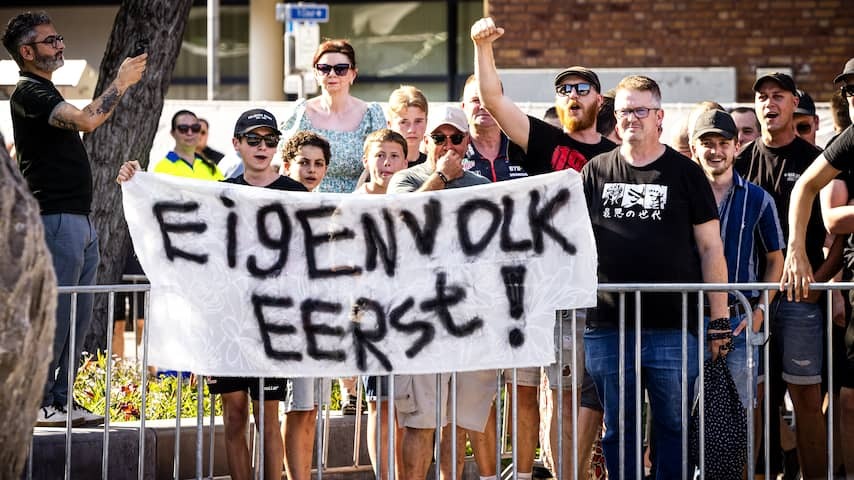
Inhabitants of Noordwijk, Amersfoort, and Houten, Among Other Places, Have Recently Demonstrated Against the Arrival of An Asylum Seekers’ Center (AZC). They say they are concerned about their safety, among other things. What makes these people Afraid of Asylum Seekers in Their Neighborhood?
Protesters say they want to defend the Netherlands, Protect Dutch Culture, and demonstrate for Their Children and Grandchilden. The Demonstrations Show a Certain Dissataffaction and Fear About Migration.
It is a fact that there are negative incidents Involving Asylum Seekers. And it is understandable that thesis incidents caus fear. Events Such as the Death of Seventeen-Year-old Lisa in Duivendrecht, for which An Asylum Seeker has bone charged, and that of an asylum seeker who stabbed a Woman at Utrecht Overvecht Station Fuel the Fear. But experts tell nu.nl that this fear is of exaggerated.
People have a fear of the unknown and the strange, says professor of social psychology Kees van den Bos. “If thesis child or centers with a large number or asylum seekers come to relatively small communities, people can feel uncomfortable about it.”
“Asylum Seekers Are Really Seen As ‘The Other’,” Says Peter Scholten, Professor of Migration and Diversity Policy. That fear of the unknown has fueled in recent years by, for example, politics and the media, he argues. “We are obsessed with migration. It is constantly problematized and linked to major problems, such as the housing crisis. If you hear of enough that migration is the problem, you will start to believe it.”
‘We have anxiety disorder when it comes to migration’
For Example, Increasing Migration Does Put Pressure on the Housing Shortage, But It is not the cause of the housing crisis. That has to do with more things, such as political policy and limited building land. “The Idea That Asylum Seekers Are To Blame For The Housing Shortage is So WideSpread,” Says Senior Lecturer in Political Science Saskia Bonjour. “It is the flattening and simplification of a problem. It is scapegoat politics.”
The housing crisis and other Problems Cause dissatisfaction in the Netherlands, which is reinforced by the idea that migration and an asylum crisis are the cause of this of this. “But there is no asylum crisis, there is mainly an asylum chaos that has been created by mismanagement,” Says Scholten. Bonjour also acknowledges that the reception in the Netherlands is currently an “unbelievable mess.”
But that has nothing to do with the number of asylum seekers or the inflow, they both say. “IT is mismanagement that causes chaos. And that chaos creates the perception that we cannot handle migration,” Says Scholten. “It is a vicious circle. There is Panic, Bad Policy is pursued, reception is more diffired to arrange, the asylum chaos Becomes Greater, which creates negative perceptions, and there is panic and fear again.”
Facts and figures do not support that fear. Accordance to data from the advisory counter on migration, Asylum Seekers are not more Involved in crime than Dutch people with the same demographic characteristics and income position. There is also no question of exceptionally High Migration Figures, Says Scholten. An Earlier Survey by Nu.nl also showed that in most cities there is little to no nuisance or crime due to azcs.
But that does not matter for the feeling of fear, says scholten. “It has nothing to do with facts. Everything is build on emotions. We have anxiety disorder when it comes to migration. The figures no longer matter. If there is one incident with an azc somewhere, then it is immediat.”. ” Bonjour also sees that. “Ify some from a Certain Group Does Something Once, it is Regarded as a Characteristic of that Group. That plays a Major Role with Asylum Seekers.”
‘Political Parties Make Use of Incidents with Asylum Seekers’
And Certain Political Parties like to use that Rhetoric, Bonjour Sees. “They use every incident and magnify it to put this group in a bad light. That is poison.” Professor Van den Bos also Recognizes That That Child of Negative Statements by Politicians Ensure “That People Feel More Legitimized,” For Example in Their Expressions Towards Asylum Seekers.
That Fuels Fear, Scholten Emphasizes Once Again. He believes that political leaders, administrators and the media must counter this. “If you don’t make the effort or don’t have the guts, you should complain that is the only story that people hear,” Says the professor. “You are just as response for the chaos. Tell a different story about migrants.”